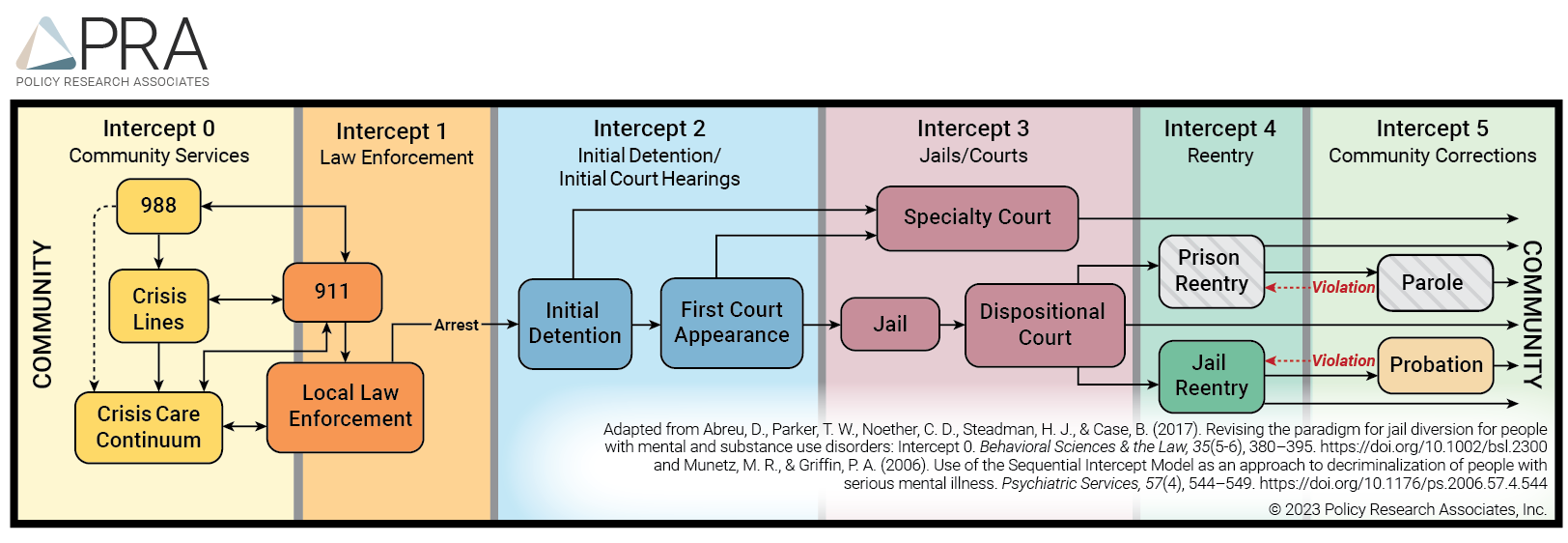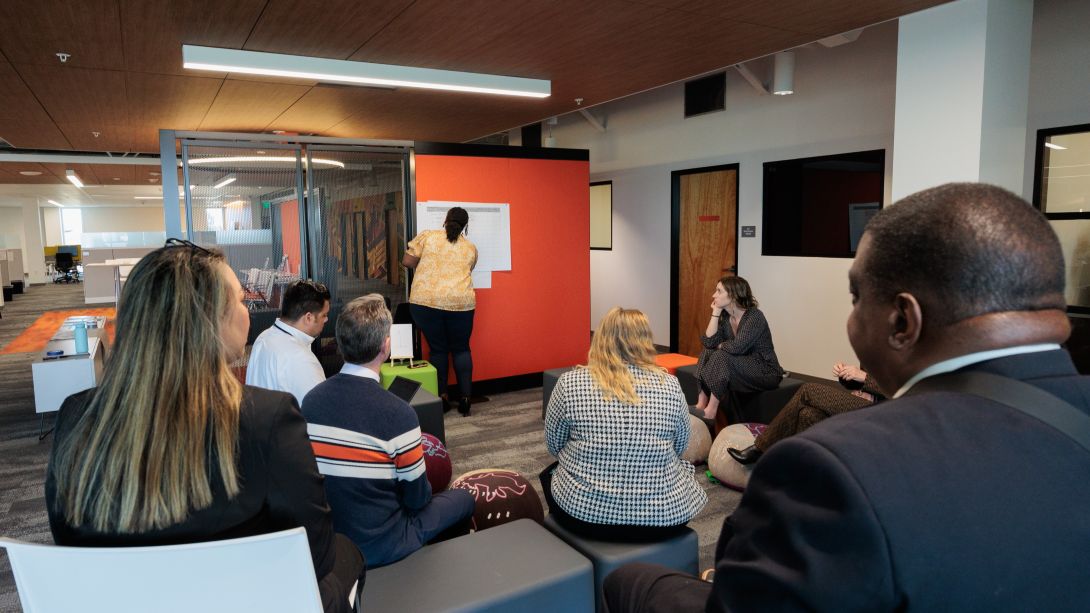People with behavioral health needs are overrepresented in the criminal legal system. Seventeen percent of people in local jails have experienced a serious mental illness. In the general population, the rate is just 6 percent (Abreu et al., 2017). In addition, 63 percent of people in jail or prison have a substance use disorder. But only one in five of them receive drug treatment while incarcerated (Abreu et al., 2017).
Law enforcement often responds to calls about low-level crimes or quality-of-life calls. Minor crimes often happen because the people involved need help with a behavioral health condition. Ideally, officers could easily connect these people with mental or substance use treatment. When that isn’t possible or simple, these individuals end up in the criminal legal system instead. This has many negative results. People in this situation are less likely to make bail and more likely to lose employment and housing, face longer sentences, and cycle through the system.
Our Solution
The Sequential Intercept Model Mapping Workshop encourages collaboration between the behavioral health and criminal legal systems. Participants consider the situation faced by people in their area with behavioral health needs. They explore how these individuals become involved with and flow through the criminal legal system. Through this process, Sequential Intercept Model Mapping Workshop attendees figure out what supports or services these individuals need and whether they already exist in the community. This allows participants to create a map of the local system. The map outlines gaps, opportunities, and resources for adults with behavioral health conditions.
Once participants have developed their cross-systems map, the group sets priorities for action. These priorities focus on improving responses for adults with mental and substance use disorders, both at the network and service levels. The facilitators share examples of best practices and evidence-based practices from around the country. This allows participants to learn from other communities, using these examples to shape local decisions. The mapping event culminates with the creation of a local strategic plan. The plan is based on the gaps, resources, and priorities identified during the mapping process.
With the Sequential Intercept Model Mapping Workshop, communities can:
- improve the early identification of adults with behavioral health needs in the criminal legal system;
- increase effective connections to complete, appropriate, and integrated services in the community;
- reduce the chances that people will cycle in and out of the criminal legal system;
- promote and support recovery;
- enhance public safety; and
- improve quality of life for all.
Our Model
Mark Munetz, MD, Patricia A. Griffin, PhD, and Henry J. Steadman, PhD, developed the linear Sequential Intercept Model. The model highlights opportunities for community-based responses for people with mental and substance use disorders involved in the criminal legal system. It does this by outlining a series of moments, called intercepts, when an individual faces possible alternatives. At each intercept, the individual could either be connected with treatment services or end up going deeper into the criminal legal system.
The Sequential Intercept Model covers six intercepts. Each highlights a key part of the criminal legal process:
- Community services: Community responses to individuals in a behavioral health crisis. Emergency medical services, fire departments, and law enforcement often provide these responses. Crisis hotlines, mobile crisis teams, peer crisis services, and other parts of the crisis response continuum may also be the point of contact at this intercept.
- Law enforcement: Law enforcement and emergency service responses to people with mental and substance use disorders.
- Initial detention and initial court hearings: When a person is detained before an initial hearing overseen by a judge or magistrate. Detention may happen in a police station, a local jail, or a court lock-up.
- Jails and courts: People in custody who haven’t had a trial yet and those whose charges have reached an outcome (e.g., the person was convicted, or prosecution was deferred). Individuals who are convicted may be sentenced to jail or prison, or their case may be transferred to a post-plea treatment court.
- Reentry: A person’s transition from jail or prison back to the community. This moment presents a need for continuity of care.
- Community corrections: Correctional supervision of individuals in contact with the criminal legal system outside of incarceration. Supervision is usually provided through probation or parole.

Participants
There are many parties involved in the Sequential Intercept Model Mapping Workshops:
- Criminal legal professionals, including law enforcement, pretrial services, courts, jails, and community corrections professionals
- Behavioral health professionals, including mental health and substance use treatment service providers
- People with lived experience in the behavioral health and criminal legal systems, as well as family members and advocates
- Social services professionals, including housing, health, and social services providers
- Appropriate state or regional representation from agencies that fund services for adults in the behavioral health and criminal legal systems
Impact in the Field
“Sequential Intercept Model Mapping Workshops are a key strategy to improving the state courts’ response to mental illness and co-occurring disorders. In fact, building on this behavioral health and criminal justice framework, [the National Center for State Courts] identified additional strategies that are important to state courts and coordinated court and community responses, including judicial leadership, civil justice, court data, and information sharing, court and community use of technology, and family and public outreach, among others.”
—Patti Tobias, Principal Court Management Consultant, National Center for State Courts
Case Studies
LA Times: Police Need More Training to Deal with Mentally Ill
Issues discussed with Los Angeles, California, are still relevant in the field today. Policy Research’s Sequential Intercept Model Mapping Workshop report outlined gaps in the system. It also highlighted the need for more crisis intervention training, crisis centers, and data/information sharing.
Montgomery Advertiser: Workshop Aims to ‘Intercept’ Mental Health
SAMHSA’s GAINS Center, operated by Policy Research, facilitated this Sequential Intercept Mapping Workshop in Montgomery, Alabama. Through the event, participants learned how to better respond to the needs of people with co-occurring mental and substance use disorders in contact with the criminal legal system.
Follow-Up Assistance
Follow-up technical help is not always needed after your cross-systems mapping event. But some jurisdictions find additional assistance useful. If your community wants more support, the Systems Mapping and Training Center is here. The Center can host follow-up meetings, including facilitated strategic planning sessions, give guidance and resources, such as walking you through the Sequential Intercept Model: Next Steps website, or connect you with topical experts. These follow-up opportunities are offered on a fee-for-service basis.



